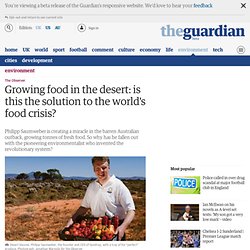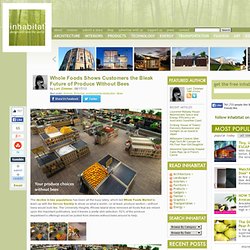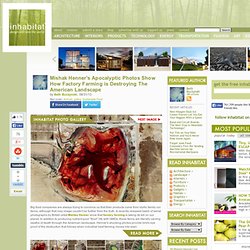

Growing food in the desert: is this the solution to the world's food crisis? The scrubby desert outside Port Augusta, three hours from Adelaide, is not the kind of countryside you see in Australian tourist brochures.

The backdrop to an area of coal-fired power stations, lead smelting and mining, the coastal landscape is spiked with saltbush that can live on a trickle of brackish seawater seeping up through the arid soil. Poisonous king brown snakes, redback spiders, the odd kangaroo and emu are seen occasionally, flies constantly. When the local landowners who graze a few sheep here get a chance to sell some of this crummy real estate they jump at it, even for bottom dollar, because the only real natural resource in these parts is sunshine. Indeed, the work that Sundrop Farms, as they call themselves, are doing in South Australia, and just starting up in Qatar, is beyond the experimental stage. It's an inspiring project, more important, it could be argued, than anything else going on in the world. If you are of an ecological bent, Paton's name may ring a bell. Whole Foods Shows Customers the Bleak Future of Produce Without Bees. The decline in bee populations has been all the buzz lately, which led Whole Foods Market to team up with the Xerces Society to show us what a world—or at least, produce section—without bees would look like.

The University Heights, Rhode Island store removed all foods that are reliant upon the important pollinators, and it leaves a pretty slim selection; 52% of the produce department’s offerings would be pulled from shelves without bees around to help. Busy bees help pollinate countless essential plants that make their way into our daily diets. To show just how important they are, Whole Foods removed quite the shopping list from their produce section: apples, onions, avocados, carrots, mangoes, lemons, limes, honeydew, cantaloupe, zucchini, summer squash, eggplant, cucumbers, celery, green onions, cauliflower, leeks, bok choy, kale, broccoli, broccoli rabe and mustard greens from their shelves.
. + Xerces Society + Whole Foods Share the Buzz Via Grist Images ©Treesha Duncan and Whole Foods. Mishak Henner's Apocalyptic Photos Show How Factory Farming is Destroying The American Landscape. Big food companies are always trying to convince us that their products come from idyllic family run farms, although that rosy image couldn't be further from the truth.

A recently released batch of aerial photographs by British artist Mishka Henner show that factory farming is taking its toll on our planet. In addition to producing nutrient-poor "food" rife with GMOs, these farms are literally carving swaths of death through the American landscape. Henner's shocking photos provide bird's eye proof of the destruction that follows when industrial beef farming moves into town. The images, discovered by Henner while researching satellite photographs of oil fields, look more like post-apocalyptic wastelands than acreage in America’s heartland. ““While I was working on that series I was looking intensely at the American landscape, and that’s when I came across these really strange-looking structures, like a big lagoon, or all these dots that look like microbes,” Henner told Fast Co. Over 500 Social Change Documentaries on 1 Page.
Just imagine what could become possible if an entire city had seen just one of the documentaries above.

Just imagine what would be possible if everyone in the country was aware of how unhealthy the mainstream media was for our future and started turning to independent sources in droves. Creating a better world really does start with an informed citizenry, and there's lots of subject matter to cover. From all the documentaries above, it's evident that our society needs a new story to belong to. The old story of empire and dominion over the earth has to be looked at in the full light of day - all of our ambient cultural stories and values that we take for granted and which remain invisible must become visible. But most of all, we need to see the promise of the alternatives - we need to be able to imagine new exciting ways that people could live, better than anything that the old paradigm could ever dream of providing. So take this library of films and use it.
Solutions. Health Impact. Energy. Water. Rain Forests. Climate Change. Environment and sustainability. Environment. National Geographic. Pew Environment Group. James Hansen: Why I must speak out about climate change. Paul Gilding: The Earth is full.